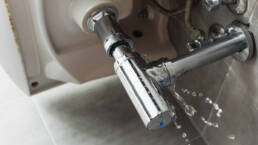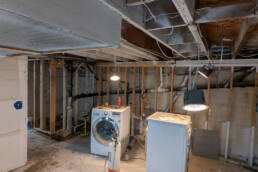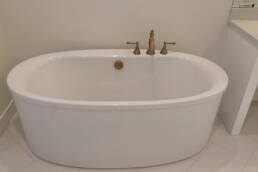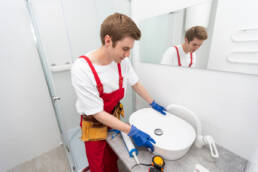Water is an essential resource in every home, but not all water is created equal. In the Denver area, one common issue that homeowners face is hard water. Hard water contains high levels of minerals, particularly calcium and magnesium, which can have a significant impact on your plumbing system and home comfort.
As your trusted Denver area plumber, Foose Plumbing understands the challenges that hard water can present to homeowners. In this blog, we’ll delve into the effects of hard water on your plumbing system, from mineral buildup in pipes to scale formation on fixtures, and discuss practical solutions to mitigate these issues.
Whether you’ve noticed limescale deposits on your faucets or are concerned about the efficiency of your water-using appliances, understanding the effects of hard water is the first step toward maintaining a healthy and efficient plumbing system in your home. Let’s explore how Denver’s hard water can affect your plumbing and what you can do about it.
Understanding Hard Water
What is Hard Water?
Hard water is characterized by its high mineral content, primarily calcium and magnesium ions. These minerals dissolve into the water as it passes through rocks and soil, picking up mineral deposits along the way. The level of hardness in water is typically measured in grains per gallon (GPG) or parts per million (PPM).
Prevalence of Hard Water in Denver
Denver and the surrounding areas are known for having hard water, with many homes experiencing levels of hardness above the national average. This is due to the region’s geological makeup, which includes mineral-rich soil and rock formations.
Effects of Hard Water on Plumbing Systems
Mineral Buildup in Pipes
As hard water flows through your plumbing system, it leaves behind mineral deposits that can accumulate over time. This buildup can restrict water flow, leading to clogs and reduced water pressure. In severe cases, it may even necessitate pipe replacement.
Scale Formation on Fixtures
One of the most visible effects of hard water is scale formation on faucets, showerheads, and other fixtures. The minerals in hard water react with soap and air, forming a white, chalky residue known as limescale. This not only affects the appearance of your fixtures but can also interfere with their functionality.
Reduced Efficiency of Water-Using Appliances
Hard water can also wreak havoc on your water-using appliances, such as water heaters, dishwashers, and washing machines. The minerals in hard water can accumulate in these appliances, forming scale deposits that reduce their efficiency and lifespan. This can lead to increased energy consumption, higher utility bills, and costly repairs or replacements down the line.
Understanding these effects of hard water on your plumbing system is essential for maintaining the health and longevity of your home’s infrastructure. In the next sections, we’ll explore how hard water can impact your daily life and discuss effective solutions for dealing with this common issue.
Impact of Hard Water on Home Comfort and Maintenance
Skin and Hair Concerns
Hard water can strip the skin and hair of natural oils, leading to dryness, irritation, and even exacerbating conditions like eczema and dandruff. Showering in hard water may leave your skin feeling itchy and your hair looking dull and lifeless.
Soap Scum and Residue
The mineral deposits left behind by hard water can combine with soap to create a sticky residue known as soap scum. This scum can accumulate on shower walls, bathtub surfaces, and bathroom tiles, making cleaning more challenging and leaving your bathroom looking less than pristine.
Stained Fixtures and Surfaces
Limescale buildup from hard water can leave unsightly stains on your fixtures, sinks, tubs, and countertops. These stains can be difficult to remove and may require harsh chemical cleaners or abrasive scrubbing, damaging the surfaces in the process.
Solutions for Dealing with Hard Water
Water Softeners
Water softeners are the most effective solution for addressing hard water problems in your home. These systems work by removing the calcium and magnesium ions from the water through a process called ion exchange, leaving you with soft, mineral-free water throughout your home.
Reverse Osmosis Systems
Reverse osmosis systems can also help improve water quality by filtering out impurities, including minerals, through a semipermeable membrane. While not specifically designed for hard water treatment, reverse osmosis systems can be effective at producing high-quality drinking water.
Descaling Agents
For those looking for a more affordable or temporary solution, descaling agents can help dissolve existing scale buildup in pipes and appliances. These agents typically contain acidic compounds that break down mineral deposits, allowing them to be flushed out of the system.
By implementing these solutions, you can effectively combat the effects of hard water on your plumbing system and enjoy the benefits of soft, high-quality water throughout your home. In the next section, we’ll provide tips for maintaining your plumbing system in hard water areas and ensuring long-term performance and durability.
Tips for Maintaining Plumbing Systems in Hard Water Areas
Regular Maintenance
Schedule regular maintenance checks for your plumbing system to catch any issues caused by hard water early on. This includes inspecting pipes for mineral buildup, checking water-using appliances for scale deposits, and ensuring that fixtures are functioning properly.
Cleaning Fixtures and Appliances
Regularly clean fixtures and appliances affected by hard water to remove mineral deposits and prevent further buildup. Use vinegar or commercial descaling agents to dissolve limescale, and scrub surfaces with a non-abrasive sponge or brush.
Monitoring Water Quality
Keep an eye on the quality of your water by testing for hardness levels periodically. This will help you gauge the effectiveness of any water treatment solutions you have in place and identify any changes or issues that may arise.
Conclusion
Hard water is a common issue that many Denver homeowners face, but it doesn’t have to wreak havoc on your plumbing system and home comfort. By understanding the effects of hard water and implementing effective solutions, you can protect your plumbing system from damage and enjoy the benefits of soft, high-quality water throughout your home.
At Foose Plumbing, we’re committed to helping Denver homeowners address their hard water problems and maintain healthy, efficient plumbing systems. Whether you need advice on selecting the right water treatment solution or assistance with installation and maintenance, our team of experienced professionals is here to help.
Don’t let hard water compromise the integrity of your plumbing system or diminish your home comfort. Contact Foose Plumbing today to learn more about how we can help you tackle your hard water issues and keep your plumbing in top shape for years to come.

Foose Plumbing: Your Premier Partner for Exceptional Plumbing Solutions
Discover unparalleled expertise and seamless collaboration with Foose Plumbing, the pinnacle of plumbing services in Denver. As the leading plumbing service, Foose Plumbing stands as the ultimate choice for construction projects seeking precision, reliability, and unwavering compliance.
Like this article? Spread the word!
Related Posts
November 15, 2024
Foose Plumbing: Denver’s Trusted Partner for Reliable, High-Quality Plumbing Solutions
Foose Plumbing offers top-tier plumbing services in Denver, Colorado. From emergency…
July 30, 2024
Essential Fall and Winter Plumbing Tips for Denver Homes
Prepare your Denver home for fall and winter with expert plumbing tips from Foose…
July 8, 2024
The Essential Guide to Choosing the Right Plumber in Denver
Discover top-notch plumbing services in Denver with Foose Plumbing. From leak detection…





